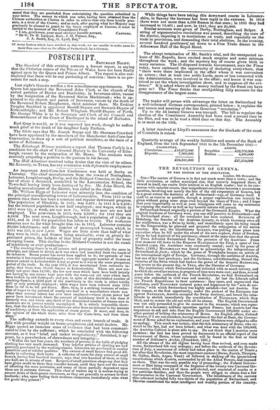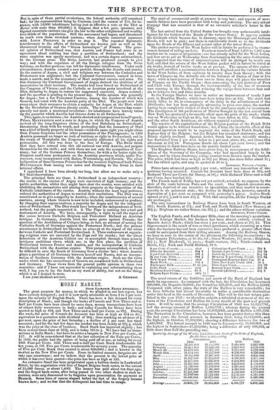THE REVOLUTION OF GENEVA.
TO THE EDITOR OF THE SPECTATOR.
Sea—The canton of Geneva is in fact not much more than a town; and the little revolution, or rather municipal riot, that recently happened there, if viewed in itself, can excite little interest in an English reader; but in its con- nexion with anterior events, that insignificant occurrence becomes a momentous question, involving not merely the fate of the old corporators of Geneva, but to a great extent the destinies of all Switzerland—nay, of Germany itself. I shall be as concise as possible, though a proper explanation can scarcely be given without going some steps even beyond the times of TELL ; and I hope that your impartiality as well as your indulgence will come to my assistance in exposing the matter as well as my humble talents will permit. Switzerland formed originally a portion of the Germanic Empire. What the original freedoms of Germany were, you can still perceive in Switzerland—and in Switzerland alone : all the remainder has been enslaved. RUDOLPH of Habsburg, the founder of the Austrian dynasty, to which Germany owes all her misfortunes, was a Swiss by birth; and immediately upon his being raised to the Emperorship, he planned and prepared the subjugation of his native country. His son, the bloodthirsty ALBERT, was putting those plans into execution when he fell under the sword of his own nephew, Jowl of Swaben, whom he had deprived of his patrimony, almost at the same time that the arrow of TELL delivered Switzerland from the presence of the Austrians. Fro= that moment till down to the Emperor Maxnm.i,aN the First, a space of two hundred years, the Austrians were constantly routed; until by the peace of Basle, (1499,) Mexusn.ras was forced to acknowledge the independence of Switzerland de facto ; which by the peace of Westphalia became an article of the international right of Europe. Germany, through the ambition of Austria, lost one of her best provinces; and the Germans, notwithstanding, blessed the victories of the Swiss which had broken the power of the despotic Hansautio, and revere to the present day, in TELL, also the liberator of Germany. The institutions which Switzerland had defended with so much bravery, and to which she owed her success, in progress of time were worn-out; and thus, several years before the outbreak of the French Revolution, we find Switzerland on every side embroiled in civil wars and anarchy. At last the Liberals called the French Republicans to their assistance : they came, and augmented the confusion, until NAPOLEON restored peace and happiness by his " acte de me- diation," with which Switzerland was highly satisfied—but not Austria. For this reason, at the first opportunity, under the pretext of the European war against NAPOLEON, Austria occupied the Swiss territory, and forced the inha- bitants to abolish immediately the constitution of NAPOLEON, which they liked, and to restore the old one with all its abuses. The English Government was not only persuaded to give its consent to the measure, which was repre- sented as a necessary military operation against France, but Austria had the impudence to ask and take from the English Government 100,000/. under an- other pretext of bribing the aristocracy of Berne. An English officer, Colonel WILSON, if I am not mistaken, having mentioned the fact at Basle, the Govern- ment of Berne asked for an explanation, and your Ministers were obliged to offer an apology. This much was certain, that the rich aristocracy of Berne, who re- sisted to the last, had not been bribed ; and what was done with the 100,0001. the Austrian Cabinet is alone able to say. Do not think that 1 mention mere surmises : the fact has been proved by documents in an official report of the Government of Berne, whose substance will be found in the first or third number of Schlosaer's Archie, (Frankfort, 1831.) All the abuses of the old regime having been thus revived, and even made worse, Switzerland felt very unhappy; and before the outbreak of the Revolu- tion of July, a movement of reform had taken place in the canton of Tessin but after that Revolution, the most important cantons (Berne, Zurich, Thurgau, St. Gallen, Basle, Argau, Vaud) all followed in shaking off the ignominious constitutions which Austria, surrounded by all the Allied Powers, had imposed on them. This was the only possible way of proceeding ; the Federal Govern- ment or Diet being composed of the Deputies of the twenty-two Cantonal Go- vernments; which were all of them self-elected, and consisted of monks or a few patrician families; and thus the people were obliged to obtain first a fair representation in the Cantonal Government. The inhabitants of the cantons thus reformed included fully two-thirds of the population of Switzerland, and likewise constituted the most intelligent and wealthy portion of the country. But in spite of those partial revolutions, the federal authority still remained bad; for the representation being by Cantons, (and the canton of Uri' for in- stance, with 14,000 inhabitants havingjust as effective a vote at the Diet as Berne with more than 400,000,) it happens that a few poor, ignorant, and bigoted mountain-cantons can give the law to the other enlightened and wealthy two-thirds of the population. Still the movement had begun, and threatened to reach even those wretched cantons; when Austria concerted measures with LOUIS PHILIPPE in order to stop it. The repeated diplomatic interferences in the affairs of Switzerland are known just as well as the threatened invasion and the " blocus hermetique" of France. The gene- ral opinion of Switzerland was, that Austria and France had come to an agreement about nothing less than a partition of Switzerland ; and the same suspicion was openly mentioned, and to a certain degree substantiated, in the German press. The Swiss' however, had prudence enough to give way; and with the expulsion of all the foreign refugees from the Swiss territory, no further pretence was left for diplomatic interference. Under such circumstances, Austria created a new pretext, through the Jesuits and monks. In the canton of Argau, a civil and religious war between the Catholics and Protestants was originated ; but the Cantonal Government, warned in time, made a search, and in the monastery of Muri surprised cannon and arms. On this discovery the Cantonal Government of Argau decreed the abolition of all monasteries on their territory. The monks had been forced on Switzerland at the Congress of Vienna; and the Catholic or Austrian party interfered at the Diet, dictating to Argau to restore the suppressed convents. Argau resisted ; and the question is pending to the present day. Public opinion was generilly for Argau ; but a few Protestant Cantons, among the number of which was Geneva, had voted with the Austrian party at the Diet. The people now take everywhere their measures to obtain a majority for Argau at the Diet, which by the Revolution of Geneva already exists. The town of Geneva has conse- quently not made a municipal revolution : its inhabitants have bravely taken up the gauntlet which Austria had thrown down to all Switzerland. This, again , is no surmise; for Austria showed and compromised herself openly. _Prince METTERNICH sent a note to Argau, in which the Emperor of Austria revived all the long-forgotten claims of the first Habsburg on Switzerland; threatening them with his wrath, and pretending that the monastery of Muri was a kind offamily property of his house—with the same right you might claim from France Guyenne and the other possessions of the Plantagenets; in 1499 Austria possessed no longer an inch of territory or right in Switzerland, and in the treaty of Westphalia the Emperor solemnly abdicated all his rights and pretensions. All this was done in the face of Europe. The Swiss think that they have entered into this old national war with Austria, and prepare themselves for the strife; and with them are not only the sympathies of Ger- many, but of the German Princes themselves; for with a far better right the Emperor could raise pretensions on the Austrian provinces which, under NA- POLEON, were incorporated with Baden, Wurtemberg, and Bavaria. The silent indignation of those German Princes has for the moment frightened back Prince METTERNICH from issuing new notes and dictating to the Swiss in their internal affairs.
I apprehend I have been already too long, but allow me to make only a few final observations.
The principal facts are these. 1. Switzerland is an independent country : the monks in the canton of Area were convicted of high treason; and the public authorities, whilst they might have shot the monks, were satisfied with -abolishing the monasteries and placing their property at the disposition of the Catholic inhabitants of the canton. Austria, without the least legal pretence, ordered the authorities of Argau to rescind their resolutions. The Diet was so constituted as to give a majority to Austria ; when the constituencies of several -cantons, among whom Geneva is now to be included, endeavoured to produce, by changing their representatives, a majority for Argau and for the independ- ence of Switzerland. The Diet would have betrayed the independence of Swit- zerland, but the people reasserted it. 2. The Pope is nothing but a tool and instrument of Austria. We have consequently, a right to call the repeal of the union between Catholic Belgium and Protestant Holland an Austrian -intrigue. In Germany, Austria tried the same game against Prussia; the question of the Archbishop of Cologne being, in fact, an attempt of setting the -Catholics South of Germany against the Protestant North; and the present occurrences in Switzerland are likewise an attempt at the repeal of the union between Catholic and Protestant Switzerland. 3. These endeavours at organiz- ing religious wars are executed by the Pope and his monks ; but the direct intentions of the Austrian Cabinet are to accomplish through these priestly intrigues ambitious views, which are, in the first place, the partition of Switzerland between France and Austria, and the incorporation of Catholic Switzerland with the Austrian empire. This purpose accomplished, it would be difficult to save the South of Germany from a similar fate; where Austria plans a partition of all Germany between herself and Russia, and an incorpo- ration of Southern Germany with the Austrian empire. Such are the views under which the late occurrences of Geneva are considered both in Switzerland and Germany. Those views form the general public opinion in those two countries : and if I have not succeeded in explaining and substantiating them well, I beg you to lay the fault on my want of ability, but not on the thing, which is as I desired to state.



























 Previous page
Previous page